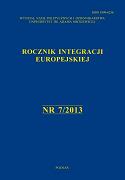Rola Parlamentu Europejskiego w procesie kształtowania Wspólnej Polityki Zagranicznej i Bezpieczeństwa UE po zawarciu Traktatu z Lizbony
The role of the European Parliament in the process of developing the EU’s Common Foreign and Security Policy after the Lisbon Treaty
Author(s): Artur StaszczykSubject(s): Politics / Political Sciences
Published by: Uniwersytet im. Adama Mickiewicza w Poznaniu
Keywords: Unia Europejska; wspólna polityka zagraniczna i bezpieczeństwa; Parlament Europejski
Summary/Abstract: The article discusses the problem of the EP’s role in the shaping of the CFSP after the changes made in the area of integration by the Lisbon Treaty. Unlike economic issues, the matters that fall within the scope of the CFSP are not traditional areas of integration, since they deal with the essence of sovereignty of the nation state, which still remains the most important actor of the process of European integration. The dominance of intergovernmental cooperation mechanisms within the CFSP determines the limited role of the PE in shaping the policy. However, it should be noted that despite its limited treaty competence in the area of foreign and security policy, the EP seeks to play a major role, often going beyond its formal powers. This is due to the fact of being the only EU institution with democratic legitimacy, and able to influence the European public opinion with a whole range of instruments of influence it has at its disposal. The growing importance of the EP in the field of CFSP also results from the Lisbon Treaty establishing unified EU external relations, where the EP has significant competence. Further development of the EP’s prerogatives in the CFSP is, however, dependent on progress in transforming the EU into a structure of major transnational powers.
Journal: Rocznik Integracji Europejskiej
- Issue Year: 2013
- Issue No: 7
- Page Range: 251-263
- Page Count: 14
- Language: Polish

